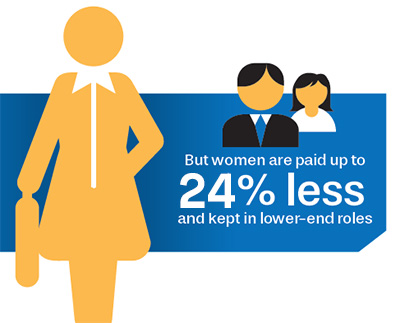Women in the changing world of work
Date:
Authors: Rebecca Tavares and Una McCauley
Across the world, all women work. They occupy varying roles and spaces, in homes, factories, farms and shops. Many have challenged conventions and stereotypes and stormed traditional male bastions, in politics, sport business and technology.

However, the world of work continues to be skewed in favour of men.
Only 50 per cent of working age women are represented in the labour force globally, compared to 76 per cent of men.
Women do most of the house hold work as well as care work, looking after children and elderly and sick relatives. Globally, women's unpaid household and care work is 2.5 times more than the same work done by men. In result, women find it harder to seek and access paid work or education, or participate in civic and community life.
In Sri Lanka, the Sri Lanka Labour force Survey shows that female labour force participation rate in 2016 was 35 per cent as compared to 74.9 per cent of men-proportions that have stayed consistent over the past five years.
Sexual harassment in work spaces and on public transport arc other factors that inhibit women from accessing paid employment. A recent study by UNFPA in Sri Lanka found that 90 per cent of women have been subjected to sexual harassment at least once on public buses and trains.
Social and cultural norms and attitudes also restrict women's participation in the labour force. There is a cost lo the unequal division of labour and the lack of opportunities for women in the world of work. Studies show that if more women entered the formal workforce, global annual GDP would increase by 12 trillion US dollars by the year 2025. Sri Lanka scores high on several development indicators, with a score of 0.691 on the 2011 Human Development Index, ranking 97th out of 187 countries, the highest in South Asia.
Commitment to achieving gender equality and women's empowerment is strong. At a Global Leaders' Summit during the Sustainable Development Goals Summit in 2015, President Maithripala Sirisena pledged to update the country's national action plan on women and ensure the protection and promotion of women's rights. A National Plan of Action lo address Sexual and Gender-Based Violence was launched in November 2016 - a clear example of political will backed by action.
Further actions to strengthen law, policies and programs that support women's economic empowerment would set Sri Lanka firmly on the path to equality, prosperity and progress.
For example, 24.3 per cent of households in Sri Lanka arc headed by women. Creating income-generating activities, ensuring access to finance and preventing their sexual abuse and exploitation are critical to restoring a sense of security and stability in their lives and essential for overall growth and prosperity.
With nearly 90,000 Sri Lankan women migrating abroad, mainly for domestic work, the protection of their rights. is another key priority.
The UN system in Sri Lanka support government efforts as well as civil society initiatives to promote women's employment and access to markets and social security. Guided by the norms and standards laid down in key human rights instruments, including the Convention on the Elimination of Discrimination Against Women (CEDAW), the UN also works with government institutions to develop policies and plans that factor in gender concerns and priorities. To improve women's access to markets, for example, the United Nations Development Programme helped 9,903 women form their own enterprises or join producer groups and organizations. A number of women have been promoted to become Board Members and Managers of Cooperatives.
In partnership with the Ministry of Women and Child Affairs, UN Women is promoting the economic empowerment of womenheaded households, particularly in Puttalam and Malara, by helping generate sustainable, long term self-employment, accessing information about markets and value addition of products, and accessing financial resources.
UN Women is also promoting the economic empowerment of women with disabilities through a project to help strengthen the gender responsiveness of employment sector. An ongoing National Survey on private sector employers' perspectives on female employment - conducted by UN Women and the Ministry of Labour and Trade Union Relations - will identify and analyze the demand-side factors that affect female labour force participation. It will also provide a baseline for the development of future policies on gender equality and women's participation in the workforce.
UN programs reach out to the most vulnerable groups of women in Sri Lankan society, including rural, low-skilled, and disabled women as well as women affected by conflict. they also work with grassroots and civil society organizations to promote women's leadership in decision making in local bodies.
International Women's Day this year is an opportunity to step It Up for gender equality so that the world of work works for all women. It spotlights globalization and technological advances that hold great promise but might be out of reach for many women. It highlights informality of labour and income inequality as key fac1ors that hold women back from participating fully in all social, economic and political arenas.
A greater focus on advancing gender equality and women's empowerment would not only result in a more inclusive society but would also step up economic growth. It would set Sri Lanka on course to meet the Sustainable Development Goals by 2030.
About the authors
Rebecca Tavares is Representative, UN Women Multi Country Office for India, Bhutan, Maldives and Sri Lanka
Una McCauley is Resident Coordinator, UN in Sri Lanka, and Resident Representative, UNDP Sri Lanka
This op-ed article was originally published in Daily Express (Sri Lanka) on 08 March 2017